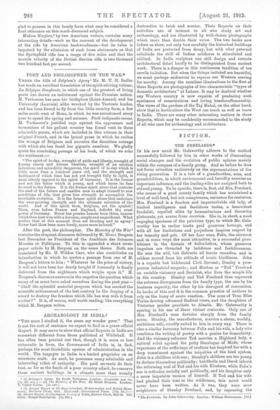POET AND PHILOSOPHER ON THE WAR.* UNDER the title of
Belgium's Agony r Mr. M. T. H. Sadler has made an excellent translation of the spirit-stirring volume, La Belgique ISanglante, in which one of the greatest of living poets has drawn an indictment against the Prussian nation. M. Verhaeren has seen his birthplace (Saint-Amend) and his University (Louvain) alike wrecked by the Teutonic hordes, and has been forced to fly from the little country farm, a few miles south-west of Mons, in which he was accustomed every year to spend the spring and autumn. Facit indignatio versus. M. Verhaeren's justified rage against the oppressors and tormentors of his gallant country has found vent in three admirable poems, which are included in this volume in their original French, and in the lyrical prose in. which he recites the wrongs of Belgium and narrates the dauntless courage with which she has faced her gigantic assailant. We gladly quote the concluding passage of his book, of which we echo the sentiment:— " The spirit of to-day, wrought of pride and liberty, wrought of human reason and human idealism, wrought of an emotion infectious and splendidly dangerous, the spirit of to-day which is little more than a hundred years old, and the strength and brilliance of which time has not yet brought fully to light, is most utterly opposed to the spirit of Germany. It is the former and not the latter which is young, and which turns its face forward to the future. It is the former spirit alone that contains the seed of the future and enables man to adapt himself to new conditions of life, that gives him strength to accomplish the inevitable evolution. It is the former spirit alone that enshrines the ever-growing strength and the ultimate salvation of the world. And of this spirit thou, Belgium, art the symbol Thou, even before France and England, defiedst the cruel power of Germany. Never has greater honour been thine, honour which thou hest won with a heroism, simple and magnificent. What matter that at this moment thou art bleeding and in agony I Never bast thou boon more lovely, never more beloved."
After the poet, the philosopher. The Meaning of the War' contains the eloquent discourse delivered by M. Henri Bergson last December as President of the Aeadaaie des Sciences Morales et Politiquea. To this is appended a short news- paper article by M. Bergson on the same theme. Both are translated by Mr. H. Wildon. Carr, who also contributes an introduction in which be quotes a passage from one of M. Bergson's letters to him " Whatever be the price of victory, it will not have been too dearly bought if humanity is finally delivered from the nightmare which weighs upon it." M. Bergson's discourse ans were in the negative the question which many of us must have asked ourselves during the past year- " Shall the splendid material progress which has marked the scientific achievement of the last century be the forging of a sword to destroy the freedom which life has won with it from matter P " It is, of course, well worth reading, like everything which M. Bergson writes..


































 Previous page
Previous page